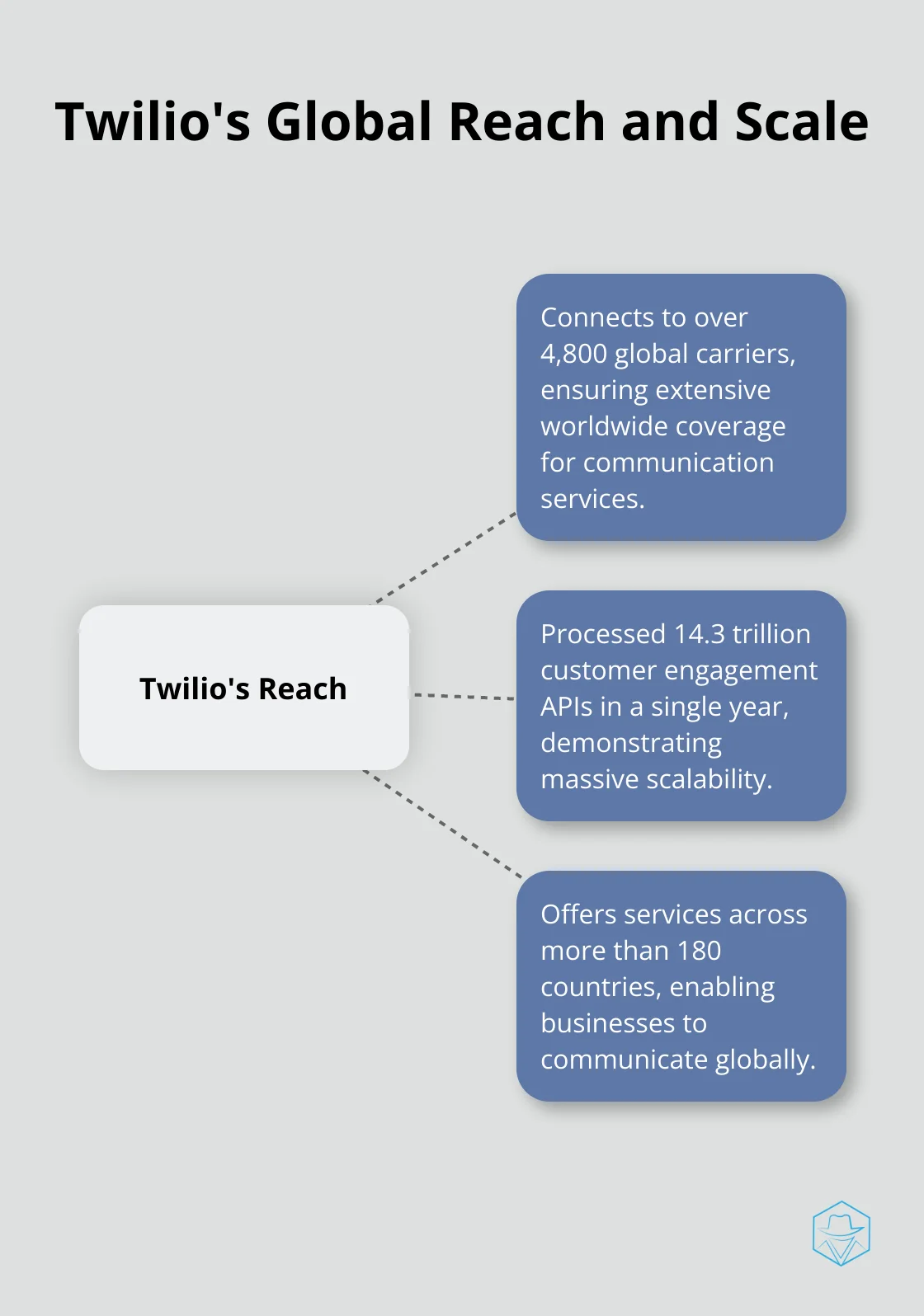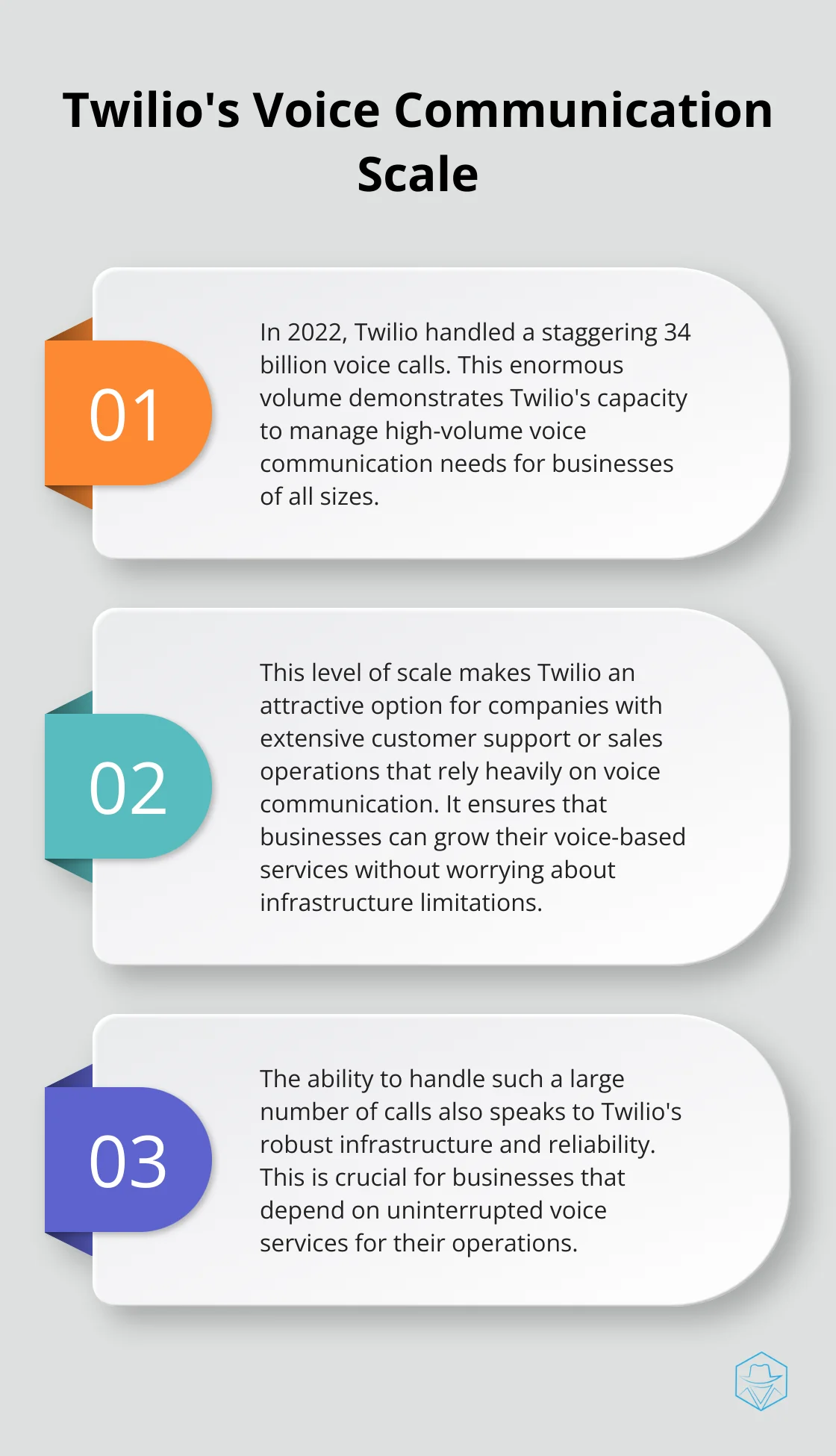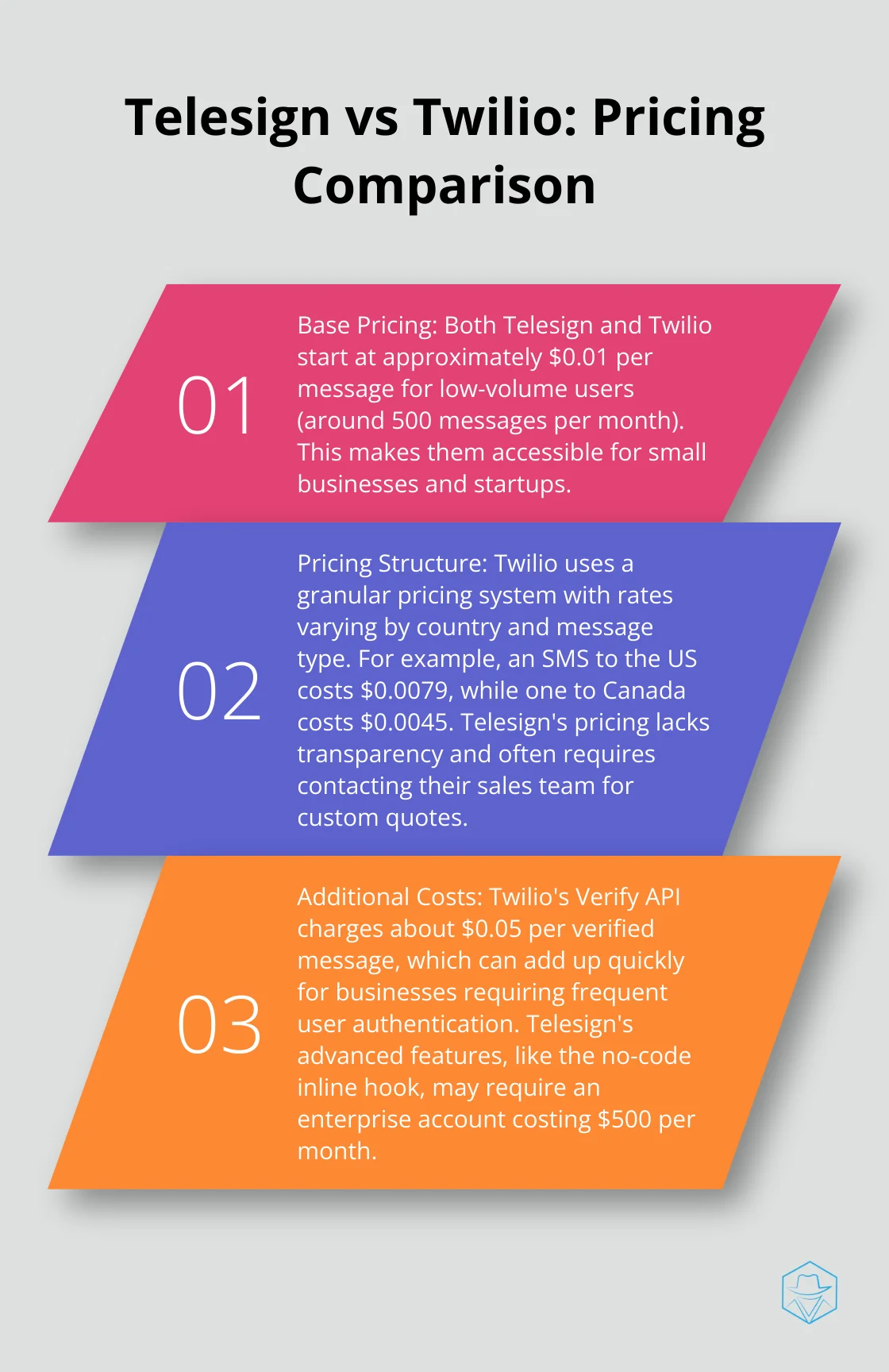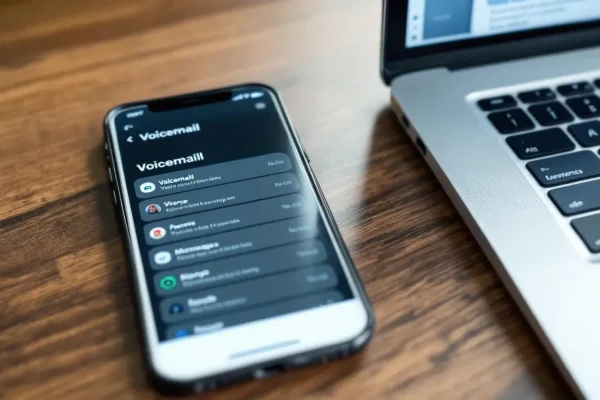How Does Telesign Compare to Twilio?

At Drop Cowboy, we often field questions about communication platforms. One common comparison that comes up is Telesign vs Twilio.
These two giants in the communication API space offer similar services, but with distinct differences that can impact your business decisions.
In this post, we’ll break down the key features, pricing, and use cases for both Telesign and Twilio to help you make an informed choice for your communication needs.
Telesign and Twilio: A Comprehensive Comparison
Company Backgrounds
Telesign and Twilio stand as titans in the communication API landscape, each with a unique history. Telesign, established in 2005, has carved out a niche in robust authentication and verification solutions. Twilio, founded in 2008, has made its mark with flexible APIs that allow developers to integrate various communication functionalities with ease.
Core Services and Features
Telesign’s Security Focus
Telesign prioritizes security and fraud prevention. Their offerings include:
- Phone number verification
- Two-factor authentication
- SMS services
These tools cater to businesses that place a premium on user account protection. Telesign’s platform helps companies verify user identities and thwart fraudulent activities (a critical concern in today’s digital landscape).
Twilio’s Comprehensive Toolkit
Twilio provides a broader range of communication tools:
- SMS APIs
- Voice APIs
- Video APIs
- Email APIs
Their Programmable Voice API enables sophisticated voice interactions, which streamlines customer support and sales processes. Twilio also offers a Customer Data Platform (CDP) that unifies customer interaction views, thereby enhancing marketing insights.
Target Markets and Industry Focus
Telesign’s Niche
Telesign’s services appeal particularly to industries with stringent security requirements:
- Financial services
- Healthcare
- E-commerce
Their emphasis on fraud prevention and identity verification makes them a top choice for businesses handling sensitive user data.
Twilio’s Wide Appeal
Twilio serves businesses across various sectors. Their client roster includes industry giants like Airbnb, Netflix, and Coca-Cola (impressive names that speak to their versatility). Twilio’s flexibility and extensive feature set make it suitable for businesses of all sizes, from startups to large enterprises.
Global Reach and Scalability
Both platforms offer global reach, but Twilio edges ahead in terms of scale. Twilio connects to over 4,800 global carriers and has processed 14.3 trillion customer engagement APIs in a single year. This massive scalability attracts businesses with high-volume communication needs.
Telesign, while smaller in scale, still provides impressive global coverage with 120+ optimized points of presence and over 700 direct-to-carrier routes for messaging.

As we move forward to compare the key features of these two communication giants, it’s important to note that businesses seeking specialized solutions in ringless voicemail and SMS marketing might find Drop Cowboy’s offerings particularly compelling. Drop Cowboy’s focus on these specific communication channels, combined with features like Mimic AI™ for voice cloning, provides a unique value proposition that sets it apart in the market.
Feature Showdown: Telesign vs Twilio
SMS and Voice Capabilities
Twilio dominates the SMS and voice arena with its extensive API suite. Their Programmable Voice API empowers businesses to create complex call flows, IVR systems, and custom contact center solutions. In 2022, Twilio handled a staggering 34 billion voice calls (a testament to its scalability).

Telesign excels in security-oriented messaging. Their SMS API prioritizes fraud prevention, making it ideal for OTPs and account verification messages.
Authentication and Verification
Telesign excels in 2FA and phone number verification. Their Phone ID API offers real-time intelligence on phone numbers, helping businesses detect potential fraud before it occurs. This makes Telesign a top choice for finance and e-commerce companies (where security is non-negotiable).
Twilio’s Verify API offers similar functionality but with broader channel support. It accommodates SMS, voice, email, and push notifications for 2FA, allowing businesses to implement authentication methods that align with user preferences.
Global Reach and Scalability
Both platforms offer impressive global coverage, but Twilio takes the lead with connections to over 4,800 global carriers. This extensive network ensures reliable message delivery across more than 180 countries.
Telesign isn’t far behind, offering services in over 200 countries and territories. Their focus on carrier-level integrations results in high-quality routes for message delivery, particularly beneficial for time-sensitive communications like 2FA.
Specialized Features
While Telesign and Twilio offer robust general-purpose communication APIs, some businesses require more specialized solutions. For instance, companies looking for ringless voicemail capabilities or advanced SMS marketing features might find Drop Cowboy’s offerings more aligned with their needs. Drop Cowboy’s platform combines these specialized features with AI-driven personalization, providing a unique toolset for businesses focused on these specific communication channels.
As we move forward to examine the pricing structures of Telesign and Twilio, it’s important to consider how these costs align with your specific business needs and communication goals.
Pricing Showdown: Telesign vs Twilio
Base Pricing Structures
Telesign and Twilio offer pay-as-you-go models with competitive pricing. Both start at approximately $0.01 per message for low-volume users (around 500 messages per month). However, their pricing structures diverge as usage increases.
Twilio implements a more granular pricing system. Rates vary by country and message type. For example, an SMS to the US costs $0.0079, while one to Canada costs $0.0045. This detailed approach benefits businesses with specific geographic targets.
Telesign’s pricing lacks transparency. They often require businesses to contact their sales team for custom quotes. This approach favors large enterprises negotiating bulk rates but may deter smaller businesses seeking immediate pricing information.

Hidden Costs and Add-Ons
While base messaging rates appear affordable, additional features can significantly increase costs. Twilio’s Verify API charges about $0.05 per verified message. This cost accumulates quickly for businesses that require frequent user authentication.
Telesign’s no-code inline hook feature (essential for some security implementations) may necessitate an enterprise account costing $500 per month. This substantial price jump can surprise smaller businesses that need advanced security features.
Cost-Effectiveness for Different Business Sizes
Startups and small businesses often find Twilio’s transparent pricing and extensive free tier attractive. Twilio offers $15-$20 worth of free credits, and its scalability ensures that growing businesses won’t outgrow the service.
Medium-sized businesses might consider Telesign’s security focus more cost-effective if fraud prevention is a primary concern. The potential savings from reduced fraud could offset higher base costs.
Large enterprises should use their volume to negotiate custom pricing with both providers. Twilio’s enterprise plans offer advanced features like dedicated short codes and priority support, which can justify higher costs for businesses with complex communication needs.
Specialized Communication Solutions
While Telesign and Twilio dominate the general communication API market, businesses with specific needs might find other solutions more suitable. For instance, companies focusing on ringless voicemail and SMS marketing should consider Drop Cowboy. Drop Cowboy’s unique pricing model only charges for successful deliveries, maximizing marketing budget efficiency.
Pricing Transparency and Negotiation
Twilio stands out with its clear, publicly available pricing. This transparency allows businesses to calculate costs easily and plan budgets effectively. Telesign’s approach of custom quotes can lead to better deals for some businesses but requires more time and negotiation skills.
Final Thoughts
TeleSign and Twilio offer robust communication solutions with distinct strengths. TeleSign excels in security and fraud prevention, making it ideal for industries handling sensitive data. Twilio provides a comprehensive toolkit, covering SMS, voice, video, and email, which suits businesses integrating multiple communication channels.
The choice between TeleSign vs Twilio depends on specific business requirements. TeleSign’s focus on security appeals to companies prioritizing user account protection. Twilio’s versatility and scalability attract businesses with diverse communication needs or plans for rapid growth.
For companies seeking specialized solutions in ringless voicemail and SMS marketing, Drop Cowboy offers unique features (such as Mimic AI™ for voice cloning). Drop Cowboy’s targeted approach provides an alternative for businesses focused on these particular communication channels.
blog-dropcowboy-com
Related posts

April 8, 2025
How to Implement Twilio Branded Calling
Learn to implement Twilio Branded Calling easily and enhance your business communication with a professional touch.

July 20, 2025
Understanding iPaaS Architecture and Its Components
Explore iPaaS architecture essentials, components, and how it improves business efficiency in our comprehensive breakdown.

March 10, 2025
Ringless Voicemail Wholesaling: Tips for Success
Boost your business with ringless voicemail wholesaling tips. Learn strategies, maximize efficiency, and drive results in your marketing efforts.

May 6, 2025
Funnel Marketing Automation: Increase Conversions
Boost conversions with funnel marketing automation. Learn practical strategies to optimize customer journeys and enhance sales performance.

July 20, 2025
Exploring Telesign API: Features and Integration Guide
Explore Telesign API features and integration tips to enhance your app’s communication capabilities effortlessly.

July 20, 2025
What is SlickText? Understanding SMS Marketing Solutions
Explore what SlickText is and learn how it simplifies SMS marketing solutions for businesses by boosting customer engagement and driving results.